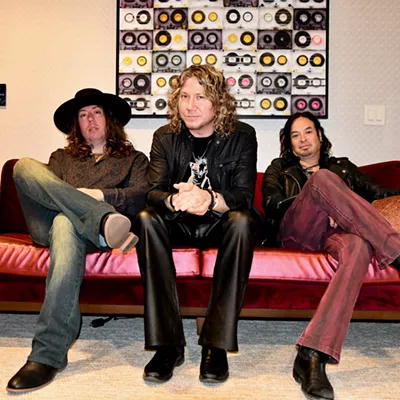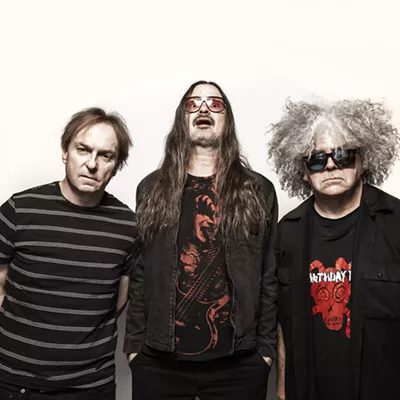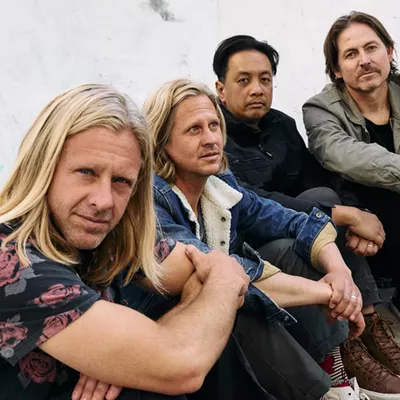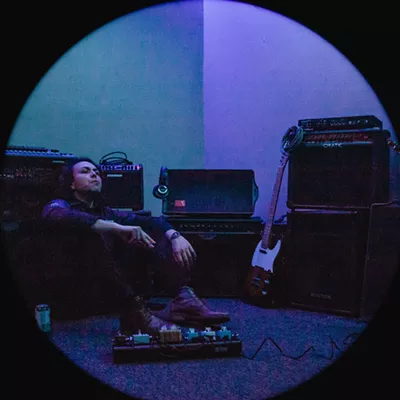Music created in the moment, whether an improvised solo, variations on a theme, or the organized chaos of a free-jazz journey, fueled the flames of musical creativity and evolution.
In the last quarter of the 20th century, jazz became part of the mainstream, and in that bid for mass popularity--you know the artists we're talking about--the fire sometimes was reduced to mere embers. But always the serious players and fans tended to jazz where it smoldered, ensuring that it never completely died out.
In Tucson for the last five years, Steve Hahn has helped rekindle an interest in improvised jazz music through his loosely organized presenting organization Zeitgeist. Other than the volunteers who help set up chairs and work the door, Hahn handles most of the Zeitgeist duties, including booking, publicity, administrative affairs and acting as the concerts' host.
Hahn, a full-time radio professional and part-time promoter, presents the Jazz at the Institute series, which has so far tallied more than 30 concerts by touring acts at the Mat Bevel Institute.
The latest in the series is tonight, April 11. Swedish alto saxophonist Biggi Vinkeloe will perform in a trio setting with Albuquerque-based tuba player Mark Weaver and drummer Harris Eisenstadt from Southern California. As usual, they will play in the colorful environment of the Downtown-area Institute, which is filled with the kinetic sculptures of performance artist Mat Bevel.
Hahn and Zeitgeist will present two more concerts before the close of this season: The Portland, Ore.-based Ron Blakeslee Quartet--trumpeter Blakeslee, trombonist Michael Vlatkovich, bassist Claude Reed and drummer Dave Storrs--will drop in Wednesday, May 1. Blakeslee, by the way, was the featured artist in the first Zeitgeist concert in May 1997.
And on Monday, May 6, Tucson guitarist and composer Matt Mitchell will present the premiere of new compositions for a jazz ensemble, probably either a quintet or a sextet. Mitchell, who plays in a wide variety of contexts, recently was named one of five nominees for this year's Arizona Arts Award.
Mitchell's gig is part of Zeitgeist's Emerging Voices series, which on an almost monthly basis presents performances by promising jazz improvisers from the Tucson area. The series includes an annual "Making It Up In Real Time" festival of local jazz artists. In a recent interview, Hahn figured he has presented at least 40 Emerging Voices shows, in addition to the Jazz at the Institute series.
Hahn says the Zeitgeist series never has been intended to compete with the jazz offerings from the Tucson Jazz Society and those of the UApresents program in at the University of Arizona's Centennial Hall. Zeitgeist concerts are meant to complement those shows.
"I've always tried to distinguish our activities from other jazz series while at the same time not ghettoize them," Hahn says in his CD-crammed office at KUAT-KUAZ radio, where his day job is as the station's music coordinator. "I consider the concerts we do as adventurous stuff that breaks the boundaries and takes the music to the next level."
Hahn also is a DJ, holding down the 5 to 11 p.m. shift Sunday nights on the classical KUAT-FM. Until last year, he also did a show of avant-garde, out-there and improvised music, titled The Ragged Edge, on community radio station KXCI-FM. It was canceled last July after 18 years on the air.
Getting people in the door at Zeitgeist shows has remained Hahn's greatest challenge, he says. Some of the concerts haven't sold as well as he would have hoped, including a performance by the group What We Live a few years ago that drew all of 19 audience members.
Other gigs have drawn larger crowds. Among the most well attended Zeitgeist concerts have been those by Steve Lacy and Roswell Rudd, the Odean Pope Trio featuring David Murray and a show boasting jazz legends Oliver Lake, Reggie Workman and Andrew Cyrille. Each of the above dates drew close to 200 jazz fans.
Once he lures listeners in the door, though, Hahn says he has been "really pleasantly surprised by the diversity of the audience" that his shows attract.
"There's a stereotype that avant-garde jazz appeals mostly to an older male demographic--you know, your maladjusted loner types," he laughs. "But there's many more women in the audience than a traditional jazz audience. And we've always marketed ourselves to a university audience, the students as well as the faculty. We get art students, music students, theater students, anyone with adventurous tastes."
Also surprising is the number of children and teen-agers who often show up at Zeitgeist concerts, often in the company of one or more gray-haired former Bohemians or hippies hoping to open up the younger ears of kids and grandkids.
The Mat Bevel Institute (a former warehouse) is known as a family-friendly environment, largely because it is the regular venue and workshop for the idiosyncratic performances of Mat Bevel himself (aka Ned Schaper). Adding to its appeal is the fact that the Institute is not a nightclub, serves no alcohol and asks smokers to do their thing outside.
Hahn says the Zeitgeist series would not exist if not for the logistical and financial assistance of the Western Jazz Presenters Network, a coalition of presenters and nightclubs in the western United States and Canada. The network shares touring information with its members and disperses grant money for touring jazz acts, courtesy of the Wallace-Readers Digest Fund.
Because admission to Zeitgeist shows are relatively inexpensive--no ticket price has exceeded $16--the biggest names playing the series can bring in only about $1,500 at the door. "We paid $3,000 for Murray and Pope, and that was after a lot of negotiating. Fortunately, we get that grant money to help bring artists to town."
Zeitgeist regulars who recall favorite Jazz at the Institute shows might not have to rely solely on their memories in the future. Ben Need, a colleague of Hahn's at KUAT-KUAZ, is the series' sound engineer. He makes a digital archival recording of each gig. Eventually, pending approval from the artists, Hahn plans to combine some of the best performances from the series in a CD. He says he and Need hope to take a serious stab at the CD project this summer.
In the meantime, those curious about how brightly burns the torch of improvisational jazz can turn to Zeitgeist, which Webster's tells us is a German word that refers to "the general intellectual, moral and cultural climate of a era."






